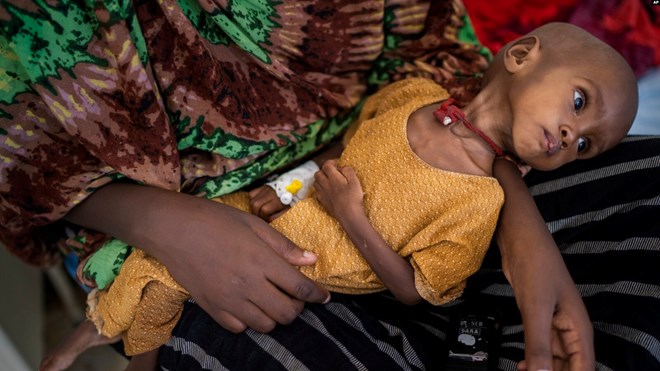
Mohamed Olad Hassan
Saturday February 25, 2023

FILE - Hamdi Yusuf, a malnourished child, is held by her mother in Dollow, Somalia, Sept. 21, 2022. Somalia is still feeling the effects of the Russian invasion of Ukraine, as escalating prices for wheat and a drought are putting millions at risk of starvation.
WASHINGTON — One year after Russia invaded Ukraine, aid-dependent Somalia is still feeling the effects, as escalating prices for wheat and the long-running regional drought put millions at risk of starvation.
According to traders in Somalia’s main markets, the price of a local food basket has increased by 49 percent over the past 12 months. Fuel prices have nearly doubled, increasing 92 percent compared to a year ago.
advertisements
Shoki Hayir, a lecturer at Mogadishu’s SIMAD University and a conflict researcher, told VOA that Russia's war in Ukraine cut off Somalia from one of its main international food sources.“Somalia had sourced more than 90% of its grains from Ukraine and Russia before the war and since it has been suffering from a shortage of food supplies in a difficult time, when thousands of people are on the verge of famine and the world largely focuses on Ukraine,” said Hayir.
Humanitarian aid has helped, but contributions are falling short, in part because Ukraine is commanding donors’ attention, said Somali economic analyst Ali Mohamed Osman.
“Somalia's crisis hasn't been at the top of donors' minds since the beginning of the Ukraine war because the humanitarian attention has shifted to the greater Ukraine devastation,” Osman said. “Therefore, the impact of the severe drought that came on the heels of the COVID-19, have largely continued, pushing Somalia closer toward famine.”
Because of Somalia’s chronically shaky security, political and environmental conditions, many nations and organizations have contributed generously over the years to help the country and its people survive. But Hayir says when those donors shift their attention elsewhere, countries like Somalia suffer.
“A nation cannot fully and always be dependent on international aid,” Hayir said. “Somalis with the help of the international community need to focus more on agricultural development and to produce their food because bigger crises can always unfold elsewhere in the world and push it deep into humanitarian crisis."
Last week, aid workers in Somalia said they were concerned about a likely reduction in humanitarian support. They said donor fatigue, compounded by multiple crises around the world that also require humanitarian support, could reduce the level of funds Somalia’s appeal received.
“The main reason why there's a donor fatigue is because, as you can imagine, Somalia has been receiving humanitarian assistance for over three decades now and the situation has not been changing,” said Mohamed Abdi, country director for the Norwegian Refugee Council.
The Somali government and humanitarian agencies recently appealed for $2.6 billion to assist about 7.6 million people in 2023. The appeal comes amid warnings that famine is a strong possibility if rains in the spring underperform and if humanitarian assistance is not sustained.
Abdiaziz Ahmed contributed to this report